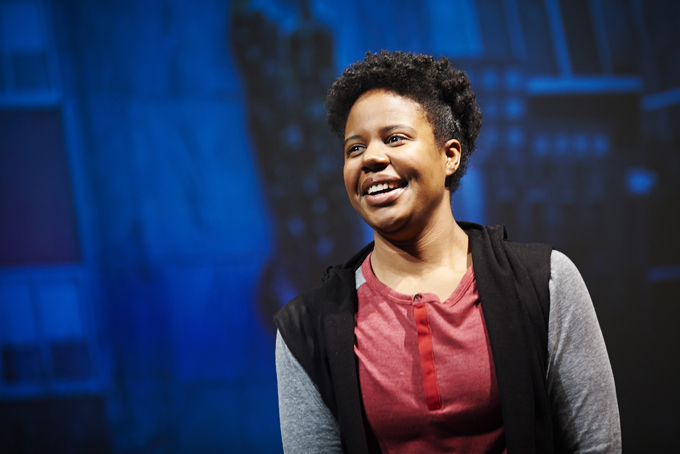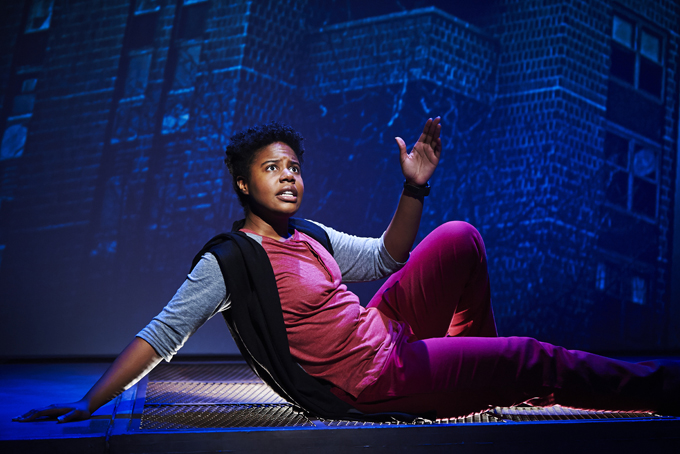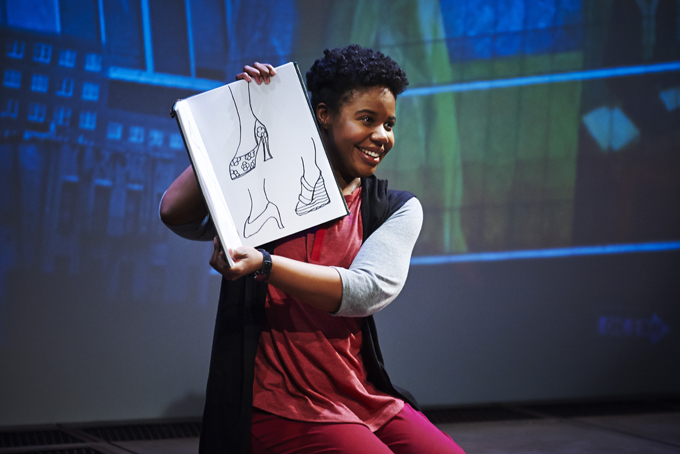
Daniel Beaty is the voice of the anonymous: the faceless, marginalized and unheralded people that we don’t acknowledge except if we bump into them, step over or around them as we go about our day-to-day life. We avoid eye contact and render them invisible.
As a playwright, poet, author and performer, Beaty uses his unique gift to strip away the vestiges of class, religion, ethnicity, gender and race to reveal the hurt, neglect, joy and pain we all experience. If you play attention you’ll pick up on a recurring theme woven throughout his work.
“My work speaks about the urgency of issues facing communities of color in our urban centers. I come from a similar environment,” Beaty says.“These communities are not often understood. Part of my goal is to give voice to the people I understand and recognize.”
Beaty has built a productive relationship with City Theatre, a collaboration that has produced a world premiere (Breath & Imagination) and his one man productions, the arrestingly intense Through the Night, Emergency and his poem Knock Knock, still a viral Internet sensation years after his“Def Poetry Jam” appearance.

Mr. Joy is Beaty’s second world premiere in Pittsburgh follows a similar format of Beaty’s previous work. Few props, a projector screen for a back wall and a spare stage, except for a covered utility box that doubles as seating and a row of assorted pairs shoes lining the front edge of the stage.
Six-year old Clarissa bounds on stage in a surge of excitement, she want to share the sketches she made in the hospital. She yells that she be back later on. 70-something Aunt Bessie is upset by the rising number of gangs in the neighborhood and decides to start her own – the Gangsta Grannies because she worries the streets could consume Clarissa like her addicted parents.
DeShawn is a 15-year old still aglow with his recent spiritual awakening. On the way to church he sees a guy just out of jail. After sharing latest info on the neighborhood he invites his friend to join him. John Lee, Mr. Joy’s son, is a real estate developer who just completed a major. Grateful for the benefits afforded him by his father’s work, he worries about his father’s legacy and the inheritance he has accumulated. Ashton, John’s estranged son, used his inheritance for a sex change operation.
Rebecca is a longtime customer of Mr. Joy. She panders this association as proof that she’s not a racist (think “Legally Blonde”) along with her Black Republican fiance’ who doesn’t want children and suffers from a identity crisis.
To portray these varied characters (and four more) requires more than heart, strength and stamina, it demands a lot of faith – faith in the playwright, faith in your own talent and the ability to step out on faith. All of this and much more is delivered by the sole actor on the stage and in the spot. The nine separate characters of various age, young, old, male, female, transgender, Black, Asian, white, poor, well-heeled, frightened, hopeful; all played by the same actor with no wardrobe change and no intermission. Who does that? Tangela Large.

A departure from Beaty’s winning formula of performing his own work, the 26-year old actor fearlessly embraces Mr. Joy and it’s many challenges. Her pacing and energy adjust to the character she’s playing. From the effervescent enthusiasm of can’t-stand-still Clarissa to the old tired indignant Bessie who is feisty and then fearful.
To be able to pull off such thespian feats requires heart and stamina and Tangela has them in spades as she plunges in the depths of each character to mine each portrayal. Chameleon-like, Large smoothly shifts from a teenager with a angry indictment :
“all of a sudden just out of nowhere there’s a generation of lost black boys? /No. The systematic destruction of a people is loud – it makes a lot of noise./ Why don’t you hear our screams?”
to an old woman clinging on to hopes and dreams of a six year old.
Large makes use each character’s nuance to make each transition authentic and complete. And she does it all (and has a very nice singing voice). Her Pittsburgh debut is nothing short of astonishing.
“Mr. Joy speaks to how we are connected to each other in ways we can’t even imagine,” says Beaty. “It poses the idea that even in the midst of tragedy and brokenness there is hope and possibility.”
Given what’s transpired in the past year, Mr. Joy is chock full of teachable moments. Maybe this will spark The Conversation.
Mr. Joy
by Daniel Beaty
January 24 – February 15, 2015 (Mainstage)
